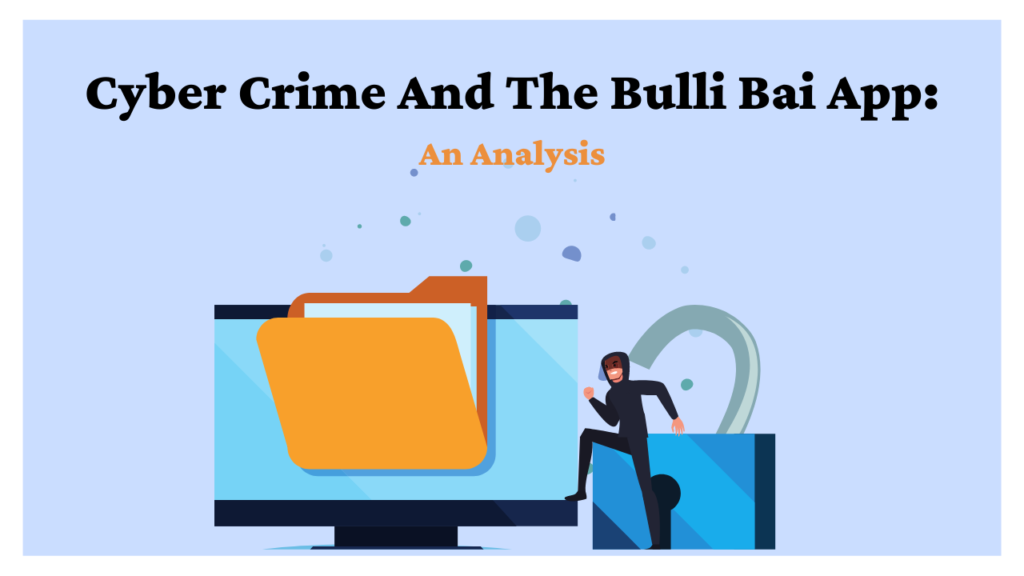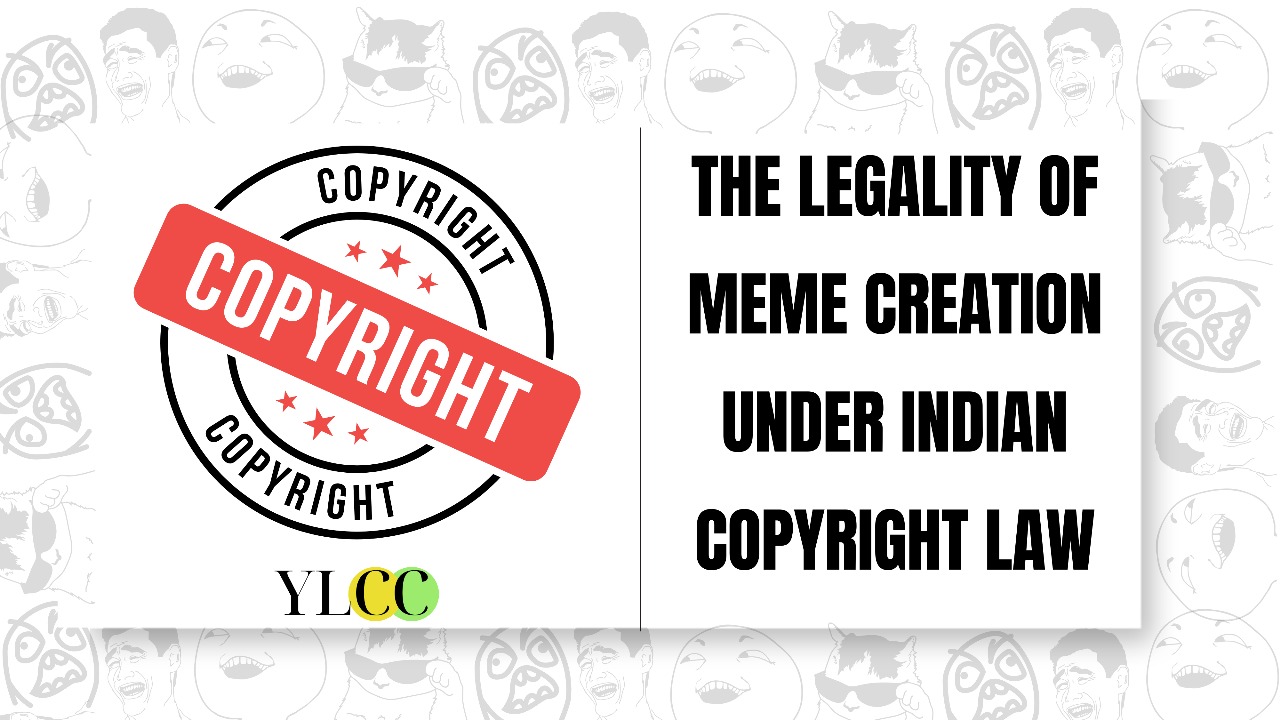
INTRODUCTION
As per the data presented by Telecom Regulatory Authority of India (TRAI) India’s total number of Internet users increased to 825.30 million in March 2021. Which means the number of internet users have a tremendous increase of 3.79% when compared to December 2020. With this sudden increase of users, the reports of cyber crime being committed has also seen a huge spike in 2020, when compared to the previous year, which is 11.8% increase. The cyber crime against women which involved bullying, stalking, publishing sexually explicit content and so on, were also in spurt as per National Crime Records Bureau (NCRB).
This article will discuss about Indian cyber laws which are mentioned in the Information Technology (IT) Act, 2000 and the recent case of Bulli Bai App which is one of the recent limelight case happened with respect to privacy concerns and created a lot of concerns among the internet users.
BACKGROUND OF “BULLI BAI APP”
The mastermind of this case was Niraj Bishnoi, a 20 year old boy who is the creator and is one of the promoters who used Twitter to spread the website’s content.[1] The Bulli bai app which was created in November 2021, is not an app which can be downloaded from an app store such as Apple iOS or Google Play Store it was a GitHub-hosted snippet of code which is in simple terms is a basic code. This app was created with a motive to use it as a harassment tool against Muslim women. Basically, this tool was used as a medium to auction “Muslim” women by compiling their personal information, photos which were taken from their social media platform profiles and a “price tag”.[2]There were over hundreds of women’s who became a trap of this application. The parties to this case were women, Git Hub, App’s Developer and Police. But this was not just a first application which caused a chaos among internet users, an application named application named Sulli Deals created by Aumkareshwar Thakur, a 25 year old boy. This application was also not an app, but just a code which used Git Hub as its host platform. It consisted the pictures of Muslim women with caption ‘deal of the day’.[3] The common thing between both the apps was there motive of creating it and the creators of those applications were college students.[4] Now, arrets have been made of the masterminds in both the cases. But these two cases were not the only two instances that happened in the past year there are several others which makes cyber crime as an alarming concern.
ANALYSIS
Although the arrests have been made, but to understand the crux and gather more information of the case more data is required, the platform used by both of these app was Git Hub, which is a foreign based software, and will require the process of MLAT for the purpose of data sharing to the Indian government A Mutual legal assistance treaty (MLAT) is an agreement between two or more countries that ease the process to collect and share information to enforce laws.[5] This process is time consuming and inefficient as it takes nearly six months to one year to be initiated, many times the requests go unheard. When its comes to the liability of Git Hub, it won’t be held liable for the content till it compliance with the requirements of due diligence. This case was a clear cut case of violation to the right of privacy. In India, under Article 21 of the Indian constitution, right to privacy is considered as a fundamental right after the judgment laid by the Hon’ble Supreme Court in KS Puttaswamy vs UOI.
The arrest of the accused were made under these provisions- Section 153 of Indian Penal code, which talks about intention to cause riot, Section 153 B of Indian Penal code which deals with imputations and assertions with respect to sovereignty, Section 500 of Indian Penal Code for defamation, Section 354 of Indian Penal Code which deals with modesty of women with respect to assault or criminal force, Section 259 A dealing with deliberate and malicious acts intended to enrage religious feelings, Section 67 of the Information Technology Act, 2000 for punishment to publish or transmit obscene material virtually.[6] Which means the offenders were booked under the provisions of IT act as well as Indian Penal code.
The conviction under the IT act and Indian Penal code is complex due to the overlapping nature of certain provisions such issue of complexity was raised in the case of Sharat Babu Digumarti v. Government of NCT of Delhi where the honourable Supreme court held that in circumstances where offence involved an electronic record, only the IT Act will apply. It is pertinent to note that several crimes for example cyber-stalking, defamation, email spoofing, and morphing which are made punishable under IPC are not covered under the IT act.[7] Moreover the IT act in not a privacy concern focused legislation. It includes certain specific provision such as section Section 66E which makes it illegal, without consent, capturing, publishing or transmitting captures, publishes, or transmits an image of a person’s private area, in circumstances that violate that person’s privacy.
CONCLUSION
This case was an alarming situation with respect to privacy concerns for women over the cyberspace. There are several instances where cyber complaints are not even entertained, this raises a big concern among the female users of social media websites or apps. Cyberviolence which is witnessed in this case has targeted the minority religious group of women which express the power of assertion. The police force’s ineffectiveness can also be primary cause of the problem. For instance, in the matter of Sulli deals, after the registration of FIR, there was no development nearly for six months. These kinds of situations hampers the right and dignity of women. Therefore, there is a need to find loopholes in the laws related to cyber crime and to have new precedents as well.
YLCC would like to thank Anam Kham for her valuable contribution in this article.
[1] FP Staff, How arrest in ‘Bulli Bai’ app case led to the nabbing of ‘Sulli Deals’ cybercrime mastermind, FIRST POST (Jan.10, 2022 11:58 AM), https://www.firstpost.com/india/how-arrest-in-bulli-bai-app-case-led-to-the-nabbing-of-sulli-deals-cybercrime-mastermind-10272501.html.
[2]Ankita Garg, What is Bulli Bai app, what is its link to Sulli Deals, and how GitHub is involved: Story in 10 points, INDIA TODAY (January 10, 2022 07:53 PM), https://www.indiatoday.in/technology/features/story/what-is-bulli-bai-app-what-is-its-link-to-sulli-deals-and-how-github-is-involved-story-in-10-points-1898365-2022-01-10.
[3] FP Staff, How arrest in ‘Bulli Bai’ app case led to the nabbing of ‘Sulli Deals’ cybercrime mastermind, FIRST POST (Jan.10, 2022 11:58 AM), https://www.firstpost.com/india/how-arrest-in-bulli-bai-app-case-led-to-the-nabbing-of-sulli-deals-cybercrime-mastermind-10272501.html.
[4] Ankita Garg, What is Bulli Bai app, what is its link to Sulli Deals, and how GitHub is involved: Story in 10 points, INDIA TODAY (Jan. 10, 2022 07:53 PM), https://www.indiatoday.in/technology/features/story/what-is-bulli-bai-app-what-is-its-link-to-sulli-deals-and-how-github-is-involved-story-in-10-points-1898365-2022-01-10.
[5]Gauri Anand and Hinduja Verma (The Leaflet), Bulli Bai and Cyber Violence: A Symptom of Power Imbalance, MONEY LIFE (12 Jan. 2022) https://www.moneylife.in/article/bulli-bai-and-cyber-violence-a-symptom-of-power-imbalance/66095.html#:~:text=On%201st%20January%201%2C%20the,other%20users%20on%20the%20app.
[6] Gauri Anand & Hinduja Verma (The Leaflet), Bulli Bai and Cyber Violence: A Symptom of Power Imbalance, MONEY LIFE (12 Jan. 2022) https://www.moneylife.in/article/bulli-bai-and-cyber-violence-a-symptom-of-powerimbalance/66095.html#:~:text=On%201st%20January%201%2C%20the,other%20users%20on%20the%20app.
[7]Priyanshi Jain & Preeti Bohra, Cyber-crime and Bulli Bai App: Where do we draw the line?, THE CRIMINAL LAW BLOG National Law University, Jodhpurhttps://criminallawstudiesnluj.wordpress.com/2022/02/17/cyber-crime-and-bulli-bai-app/.







